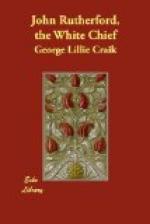[Footnote BV: Tui Tapu.]
[Footnote BW: Utu. This is another great institution amongst the ancient Maoris. It represents the principle of payment, an equivalent, a return, compensation, or satisfaction for injuries.]
[Footnote BX: Tamihana.]
CHAPTER XI.
For some time after his return from Cook Strait, Rutherford’s life appears to have been unvaried by any incident of moment.
“At length,” says he, “one day a messenger arrived from a neighbouring village, with the news that all the chiefs for miles round were about to set out, in three days, for a place called Kipara,[BY] near the source of the river Thames, and distant about two hundred miles from our village. The messenger brought also a request from the other chiefs to Aimy to join them along with his warriors; and he replied that he would meet them at Kipara at the time appointed. We understood that we were to be opposed at Kipara by a number of chiefs from the Bay of Islands and the river Thames, according to an appointment which had been made with the chiefs in our neighbourhood.
“Accordingly, everything was got ready for our journey as quickly as possible; and the women were immediately set to work to make a great number of new baskets, in which to carry our provisions. It is the custom for every person going on such an expedition to find his own arms and ammunition, as also provisions, and slaves to carry them. On the other hand, every family plunder for themselves, and give only what they think proper to the chief. The slaves are not required to fight, though they often run to the assistance of their masters while engaged.
“When the day was come for our departure, I started along with the rest, being armed with my mery, a brace of pistols, and a double-barrelled fowling-piece, and having also with me some powder and ball, and a great quantity of duck-shot, which I took for the purpose of killing game on our journey.
“I was accompanied by my wife Epecka, who carried three new mats to be a bed for us, which had been made by Eshou during my absence at Taranake.
“The warriors and slaves, whom we took with us, amounted in all to about five hundred; but the slaves, as they got rid of the provisions they carried, were sent home again, as we had no further use for them. While on our journey, if we came to a friendly village at night, we slept there; but, if not, we encamped in the woods. When the provisions we had brought with us were all consumed, we were compelled to plunder wherever we could find anything. Our journey, being made during the rainy season, was more than usually fatiguing. We were five weeks in reaching Kipara, where we found about eleven hundred more natives encamped by the side of a river. On our arrival, huts were immediately constructed for our party, and one was allotted to me and my wife. We had also two female slaves allowed us for the purpose of digging fern-root, gathering cockles, and catching fish, which articles were our only provisions while we remained here; unless now and then, when I went to the woods, and shot a few wood-pigeons or a wild pig.”




